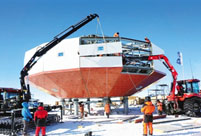 Amazing cliff diving in cold winter
Amazing cliff diving in cold winter
 Enjoy Sochi 2014 in slow motion
Enjoy Sochi 2014 in slow motion
 University student sentenced to death for poisoning roommate
University student sentenced to death for poisoning roommate
 Chinese lunar New Year celebrated in San Francisco
Chinese lunar New Year celebrated in San Francisco
 Taiwan Lantern Festival 2014
Taiwan Lantern Festival 2014
 Haiyang Yangge: make up
Haiyang Yangge: make up
 China's top 10 richest cities
China's top 10 richest cities
 President Xi visits garrison troops in Inner Mongolia
President Xi visits garrison troops in Inner Mongolia
 Turnip sculptures amaze tourists in Qingdao
Turnip sculptures amaze tourists in QingdaoThe US plan to create the position of Arctic ambassador, and the increasing attention the region is getting from countries such as Denmark and Japan, which have set up so-called 'Arctic envoys', show that competition for the region's untapped natural resources is heating up, experts say.
U.S. determined to participate in Arctic affairs
US Secretary of State John Kerry has sent letters on Feb 14, 2014 to Mark Begich and Lisa Murkowski, the two senators from Alaska, the northernmost US state, stating his intention to name a "high-level individual of substantial stature and expertise" to serve as Arctic special representative.
Last May, the Obama administration issued the first U.S. "Arctic National Strategy” and proposed a major triple U.S. focus on Arctic affairs - safeguarding the people, the country 's territorial sovereignty and its natural resources, exploitation of resources in a responsible and environmentally friendly manner, and strengthening international cooperation on Arctic development.
In addition, the U.S. Coast Guard announced their plans in the Arctic area over the next 10 years, including expanding cooperative relations with other countries in the Arctic region with the team's experience and expertise.
Russia will not surrender the North Pole to anyone
Faced with a double temptation - natural resources and shipping lanes - Russia will fight for every inch of the Arctic region.
"We will not give the North Pole to anyone,” said Artur Chilingarov, Russian federation Council member, in response to a statement from the Canadian foreign minister at the end of 2013 that the country intended to extend seabed claims in the Arctic to include the North Pole in a bid to assert its sovereignty in the resource-rich region.
From 2014 to 2020, Russia will spend $ 63 billion on Arctic development. Last year Russia set up three rescue centers around the North Pole to respond to emergency situations in the Arctic, and plans for seven more before 2015.
Swedish optimistic on Arctic mining
15% of Sweden's territory is located within the Arctic Circle. The Swedish government issued a "Swedish Arctic Strategy" in October 2011 and advocates scientific research first, and development with environmental awareness.
Swedish businesses are conducting extensive operations in the Arctic. Their ore and mineral extraction activities date back several centuries, and there have been significant levels of investment in the Swedish mining industry. Base metals, iron and titanium projects are also under way in the area.
Arctic countries expect strong cooperation with China
The Arctic Council granted China observer status on May 15 last year.
Dr. Friedman Woolf told People’s Daily that it is very important for China to become an observer on the Arctic Council. China has rich experience in polar research and climate change research. Pointing out that Chinese research vessel and icebreaker Xuelong (Snow Dragon) has collected a great deal of scientific data, the senior Swedish researcher at the Polar Research Institute believes that China will make an important contribution to the Council.
The Deputy director of RIA Novosti’s international projects center said that the Arctic does not belong to any one country, and the problems that exist in the region require multinational co-operation.
The article is edited and translated from 北极博弈出现升温趋势(国际视点), source: People's Daily, author: Liao Zhengjun, Chen Xiaowei and Liu Zhonghua.
 Most gorgeous female celebs in Chi-pao
Most gorgeous female celebs in Chi-pao Second round of test kicks off at Beijing Film Academy
Second round of test kicks off at Beijing Film Academy Ancient Qiang people had vertically grown teeth
Ancient Qiang people had vertically grown teeth Top 10 Chinese youth’s favorite seaside destinations
Top 10 Chinese youth’s favorite seaside destinations Traditional Tibetan clothing tailors
Traditional Tibetan clothing tailors In photos: Unveiling Taishan station
In photos: Unveiling Taishan station Beautiful moments of family reunion
Beautiful moments of family reunion 10 Valentine's Day ideas for couples
10 Valentine's Day ideas for couples Let's get married today!
Let's get married today! Chinese warplanes C919 to appear at Singapore Airshow 2014
Chinese warplanes C919 to appear at Singapore Airshow 2014 Ruins of Shang Dynasty's structure unearthed in Shaanxi
Ruins of Shang Dynasty's structure unearthed in Shaanxi  Intercity high speed train in operation
Intercity high speed train in operation Severe coldness freezes large parts of China
Severe coldness freezes large parts of China  Beautiful moments of Sochi
Beautiful moments of Sochi  It's not just performing this year
It's not just performing this yearDay|Week|Month